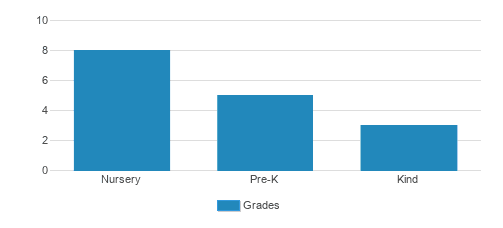The Auditory-Oral School of San Francisco teaches students who are deaf or hard of hearing to listen and talk, preparing them to learn in general education classrooms with their hearing peers.
We also have a toddler class for hearing students with speech delays and a typically developing preschool for children ages 2.5-5.5 We are a member school of OptionSchools International, see: www.oraldeafed.org.
School Overview
School Type
Grades Offered
Grades Nursery/Preschool
Learning Difference Programs
Yes
Learning Programs Supported
Language based
Year Founded
1954
Summer School Offered
Yes
School Calendar
Student Body
Total Students
18 students
Student Body Type
Co-ed
% Students of Color
40%
State avg.: 51%
Students by Grade

Academics and Faculty
Total Classroom Teachers
2 teachers
Student : Teacher Ratio
9:1
National avg.: 13:1
% Faculty w/Advanced Degree
100%
Average Class Size
6 students
Classroom Dress Code
Casual
Tuition and Acceptance Rate
Admission Deadline
Aug. 15 / rolling
Tuition Notes
Please contact the school for tuition information as tuition is dependent on which program in which a child is enrolled. Scholarship funds are offered to families with demonstrated need.
% on Financial Aid
50%
Admissions Director
Janet Christensen, MA
Extracurriculars
Total ExtracurricularsTotal Extra-curric.
2 extracurriculars
ExtracurricularsExtra-curric.
Homework Club for Mainstreamed Students, Summer Camp
School Notes
- School Program and Services include: Collaboration with outside agencies, Outreach and admissions procedures for new students from other agencies and professionals, Student records document goals and objectives developed in collaboration with parents and professionals, Annual report of individual student assessment and progress is provided to parents and professionals Individualized Instruction with Expectations for learning and achievement are consistent with peers who have normal hearing Developing individualized plans and goals based on ongoing assessment Family-centered practice in developing goals and objectives in collaboration with professionals and families Students are assessed on a regular basis on their progress towards goals and objectives and this progress is shared with parents Student progress is documented and recorded Cognitive-Based Instruction: Teachers prepare daily lessons targeting their students auditory, speech and language goals Instruction is individualized and students are placed within the curricula based on assessment of auditory , speech and language skills development Curriculum encourages teacher creativity and flexibility to meet individual student goals Curriculum focuses on a continuum to provide continuity in language and cognitive development Curriculum is age appropriate and comparable in scope to peers with normal hearing Group and individual instruction is coordinated Student progress in academic readiness and speech, auditory and language skills development is individually documented and recorded Auditory, Speech and Language Curriculum Audiological Management by licensed and experienced pediatric audiologists, including testing, hearing aid fitting and management, repairs and professional support collaborating with teaching staff Instructional areas are acoustically appropriate with minimal ambient noise and classrooms and therapy rooms have observation areas available to parents and professionals All educational personnel hold the appropriate credentials, licenses and/or certificates, and have training and experience on oral deaf education Programs and instruction are family-centered and parent input is valued Resource materials are available for parents in English, Cantonese, Spanish and other languages Early Intervention Collaboration with service providers to meet each family's needs Parent education and caregiver support Weekly parent-infant class (starting October 2006) Counseling following newborn screenings Assessment Ongoing assessment to inform instruction conducted by teachers and therapists A variety of age appropriate instruments and tests are available onsite (see supporting documents) Expertise in assessing children with hearing loss Expertise in assessing the unique needs of children using hearing aids Expertise in assessing the unique needs of children using CIs Assessments selected and administered to accurately test and demonstrate child's abilities Comprehensive annual formal assessments and written reports for each student
Source: National Center for Education Statistics (NCES)
Frequently Asked Questions
When is the application deadline for Hearing & Speech Center Of Northern California?
The application deadline for Hearing & Speech Center Of Northern California is Aug. 15 / rolling (applications are due on Aug. 15 but additional applications are reviewed year-round as space permits ).
In what neighborhood is Hearing & Speech Center Of Northern California located?
Hearing & Speech Center Of Northern California is located in the Western Addition neighborhood of San Francisco, CA. There are 1 other private schools located in Western Addition.
Recent Articles

A Parent's Guide To Understanding High School Teaching Methods
This comprehensive guide helps parents navigate the various teaching methods used in today's high school classrooms. By understanding these approaches, you'll be better equipped to support your teen's learning journey, communicate effectively with teachers, and create a complementary learning environment at home.

February 08, 2025
Social Emotional Learning: Education's Hidden SymphonyA musician's perspective on Social Emotional Learning reveals how this educational framework orchestrates success through five essential emotional competencies.

January 24, 2025
A Roadmap For Starting A Private SchoolUse this roadmap as a set of talking points with your trusted mentors and professionals to start the private school of your dreams. You're not alone. Over the years, hundreds of folks like you have had the same dream. From Quintilian to Maria Montessori to Lucy Madeira Wing, visionary educators have established schools to teach according to their beliefs and methodologies.
















